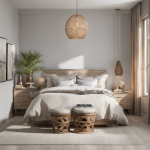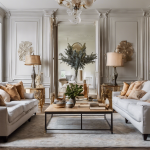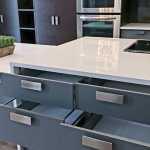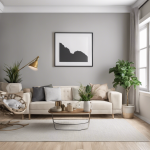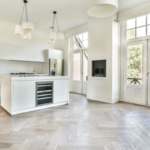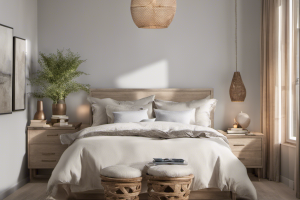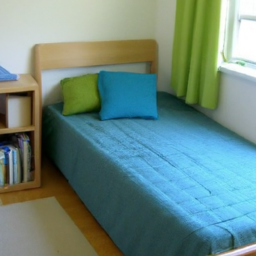
Have you ever felt your bedroom needs to be more significant to decorate? Trust me; you're not alone. Many people need help with making the most of a limited space. But don't worry, because, in this article, we will give you some valuable tips on how to make the most of your small bedroom.
When it comes to decorating a small bedroom, there are six key elements that you should focus on. Interior designers have recommended these elements and can help you create a stylish and functional space, even on the smaller side. I'm not giving away all the details yet, but I promise you'll learn more about these elements as you continue reading. So, if you're ready to transform your small bedroom into a cozy retreat, keep reading because we've got some great ideas!
When it comes to decorating a small bedroom, every decision counts. The limited space requires careful consideration of the critical elements that can make or break the overall design. This article will explore the six key elements essential to creating a stylish and functional small bedroom. Understanding and incorporating these elements into your design can transform your small space into a cozy retreat.
Introduction to Small Bedroom Decoration
Decorating a small bedroom poses unique challenges. The limited space calls for innovative design solutions to maximize every square inch. However, you can create a spacious and inviting room with the right approach and a focus on critical elements.
Importance of Considering Key Elements
Before we delve into the six key elements, it is essential to understand why they are crucial in small bedroom decoration. These elements are the building blocks of a well-designed small bedroom. By carefully considering each piece, you can create a harmonious and functional space that meets your needs.
Overview of the 6 Key Elements
Now, let's take a closer look at the six key elements that are essential for decorating a small bedroom:
1. Colors and Lighting
The choice of colors and lighting dramatically impacts the perception of space in a small bedroom. Light and neutral colors can create a sense of openness and brightness. On the other hand, dark or bold colors can make the room feel smaller and more crowded. Additionally, incorporating ample natural and artificial lighting can further enhance the illusion of space.
When selecting the color scheme for your small bedroom, consider using lighter shades such as soft pastels, whites, or pale neutrals. These colors reflect light, making the room appear larger. It is also essential to optimize natural light by keeping windows clear and incorporating sheer curtains or blinds that allow ample light to flow into the room. Opt for ambient and task lighting for artificial lighting to create a well-lit and inviting space.
2. Furniture and Storage Solutions
Choosing the right furniture and storage solutions is crucial in a small bedroom. To maximize space, opt for space-saving furniture, such as a platform bed with built-in storage or a loft bed with a desk underneath. These multifunctional pieces serve a dual purpose, providing both comfort and storage.
In addition to space-saving furniture, consider employing creative storage solutions. Utilize vertical space by installing floating shelves or wall-mounted cabinets. Use under-bed storage containers or bins to maximize the area beneath your bed. Maximizing storage options can keep your small bedroom organized and clutter-free.
3. Bed Placement and Size
The placement and size of the bed play a significant role in the overall layout of a small bedroom. Generally, position the bed against the longest wall to maximize floor space. This arrangement creates a sense of openness and allows for better traffic flow within the room.
When it comes to bed size, consider the dimensions of your bedroom. Opting for a smaller bed, such as a twin or a full length, can create more space for other furniture or storage solutions. However, if you prefer a larger bed, consider alternative options such as a daybed or a Murphy bed that can be folded away when unused.
4. Wall and Ceiling Decor
The walls and ceiling of a small bedroom offer an opportunity to add personality and visual interest to the space. Consider incorporating wallpaper or paint with subtle patterns or textures to create depth without overwhelming the room. Vertical stripes, for example, can create an illusion of height, making the ceiling appear higher.
Mirrors are also a great addition to a small bedroom as they reflect light and create an illusion of space. Place a full-length mirror on the wall or opt for a mirrored wardrobe to visually expand the room. Additionally, consider hanging artwork or photographs that are of an appropriate scale to the size of the room. These decorative elements can add personality and create a focal point in the small space.
5. Window Treatments
Window treatments provide privacy and impact the overall design of a small bedroom. Choosing suitable window coverings is essential in maintaining balance and harmony in the room. Opt for curtains or blinds that are lightweight and minimalistic to allow for maximum light penetration.
If privacy is a concern, consider layering sheer curtains with blinds or shades. This allows you to control the amount of natural light while maintaining privacy when needed. Additionally, consider installing curtain rods higher and broader than the window frame. This trick creates an illusion of height and width, making the room appear larger.
6. Organization and Decluttering
Keeping a small bedroom organized is essential for maintaining a functional and inviting space. Ensuring that everything has its place can prevent clutter and maximize available space. Storage solutions such as closet organizers, drawer dividers, or storage bins are used to keep belongings tidy and easily accessible.
Regular decluttering is also crucial in a small bedroom. Let go of items that are no longer needed or used. This will free up space and create a sense of calm and tranquility in the room.
Conclusion
In conclusion, decorating a small bedroom requires careful consideration of the six key elements: colors and lighting, furniture and storage solutions, bed placement and size, wall and ceiling decor, window treatments, and organization and decluttering. By understanding the significance of each element and incorporating them into your design, you can create a small bedroom that is both stylish and functional. Remember, with the right approach and focusing on maximizing space, even the smallest of bedrooms can become a cozy retreat.

James Smith is our editor. He is an accomplished and versatile news writer with over a decade of experience covering a wide range of topics, including politics, business, and real estate. Throughout his career, James has been dedicated to uncovering the truth and presenting unbiased, factual reporting to his audience.


